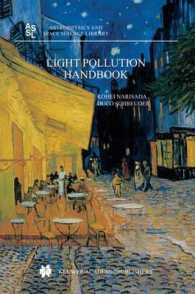Full Description
Languages change and they keep changing as a result of communicative interactions and practices in the context of communities of language users. The articles in this volume showcase a range of such communities and their practices as loci of language change in the history of English. The notion of communities of practice takes its starting point in the work of Jean Lave and Etienne Wenger and refers to groups of people defined both through their membership in a community and through their shared practices. Three types of communities are particularly highlighted: networks of letter writers; groups of scribes and printers; and other groups of professionals, in particular administrators and scientists. In these diverse contexts in England, Scotland, the United States and South Africa, language change is not seen as an abstract process but as a response to the communicative needs and practices of groups of people engaged in interaction.
Contents
1. Preface; 2. Communities of practice as a locus of language change (by Jucker, Andreas H.); 3. I. Letter writers; 4. The role of communities of practice in the emergence of Scottish Standard English (by Cruickshank, Janet); 5. Mixing genres and reinforcing community ties in nineteenth-century Scottish correspondence: Formality, familiarity and religious discourse (by Dossena, Marina); 6. Communities of practice, idiolects, and community grammar: Variation in the past tensebe paradigms in the Civil War letters from Northeastern South Carolina (by Dylewski, Radoslaw); 7. Community or communities of practice?: 1820 petitioners in the Cape Colony (by Wlodarczyk, Matylda); 8. II. Scribes and printers; 9. Crafting text languages: Spelling systems in manuscripts of theMan of Law's Taleas a means of construing scribal community of practice (by Rogos, Justyna); 10. Typographical and graphomorphemic features of five editions of the Kalender of Shepherdesas elements of the early printers' community of practice (by Rutkowska, Hanna); 11. Printing houses as communities of practice: Orthography in early modern medical books (by Tyrkko, Jukka); 12. Elizabeth Montagu's Shakespeare essay (1769): The final draft and the first edition as evidence of two communities of practice (by Sairio, Anni); 13. III. Professionals; 14. Of ledenum bocum to engliscum gereorde: Bilingual communities of practice in Anglo-Saxon England (by Timofeeva, Olga); 15. How a community of practice creates a text community: Middle Scots legal and administrative discourse (by Kopaczyk, Joanna); 16. "These two, Physitians and Chirurgeons, are to be intimate friends together": Early Modern English community of medical practitioners (by Hebda, Anna); 17. The formation of the Royal Society as a community of practice and discourse (by Gotti, Maurizio); 18. Index of names; 19. Index of subjects







